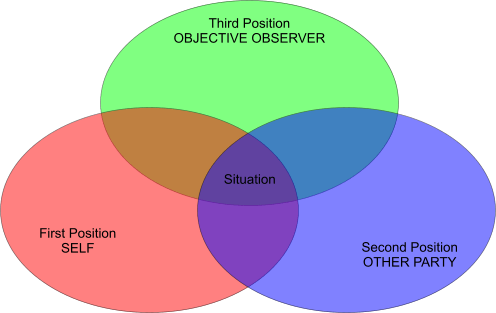An important aspect of learning is the developed ability to see things from multiple points of view. To only see things from one's own point of view makes one narrow-minded indeed.
Seeing things from multiple angles is crucially important for NLP practitioners, but also vital for all kinds of personal relationships as well. NLP formaly names these positions:

First Position
First position is the default position for everybody. It is me and my story, my wants, my needs, my position and my point of view. There is nothing wrong with first position, however being limited to first position is a guaranteed way to cut oneself off socially.
Second Position
Second position is the you in I and you. When relating to another person, it is essential to elevate that person from an object or "it" to a you, or even a thou. This is achieved when we focus our attention on the other person to the degree that we are able to see as they see, hear as they hear, and feel as they feel. Taking the second perceptual position is effective any time, but most powerfully effective when taken in real time. That is in the presence of the other person.
In relationships that really matter, we need to be sure that we "walk a mile in their shoes". NLP provides wonderful exercises, where for an hour or a day, we actually walk and talk and think like the other person, in order to adopt their persona on a temporary basis. Under hypnosis, the NLP practitioner may also encourage the client in a relationship to circle around, and then float down into the body of their partner, in order to experience their world through their senses. From time to time Gandhi also assumed the perspectives of the Indian, the Muslim, and the British, in deep meditation, whose conflicting vistas needed reconciliation.
Contrast the presidencies of Abraham Lincoln, who filled his cabinet with many dissenters from his own point of view, with that of George W. Bush, where dissenting opinions were few and far between. One may not be in agreement with other points of view, but when the stakes are high, we must take pains to take those other points of view under advisement.
Third Position
Third position is when we are able to imagine ourselves relating to another party, but observing that relating as an independent and unbiased bystander. The point of this exercise is to be able watch the dynamics going on between oneself, the other person, and not have any stake in the outcome, except to learn from the observation.
Businesses often invite meeting moderators to observe the meeting, set ground rules, and provide feedback on the quality of the interactions in the meeting, rather than participating in the discussion itself. Family and relationship counselors also play the role of third position observer, when conflicting views are being expressed.
It's difficult, though very profitable, to take the third position in one's own relationship, but in doing so, one must make sure to completely abandon any biases towards one party or the other. As you imagine yourself as the unbiased observer, check to be sure that your position is spatially at a midpoint between both parties, and that both parties seem equal in size, position, volume, influence, etc.